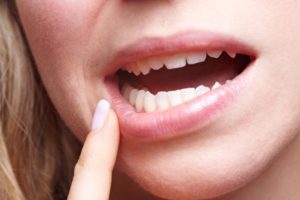Impacted Wisdom Teeth
 Dr. Carol Jin, DDS treats impacted wisdom teeth in San Ramon, California. Impacted wisdom teeth are a common problem caused by a combination of genetics and the size of your mouth. Early intervention is key to preventing severe damage to your teeth and gums. See us for an evaluation of your wisdom teeth and consultation on what you should do next to keep your mouth healthy.
Dr. Carol Jin, DDS treats impacted wisdom teeth in San Ramon, California. Impacted wisdom teeth are a common problem caused by a combination of genetics and the size of your mouth. Early intervention is key to preventing severe damage to your teeth and gums. See us for an evaluation of your wisdom teeth and consultation on what you should do next to keep your mouth healthy.
What Are Impacted Wisdom Teeth?
Wisdom teeth become impacted when there isn’t enough room in your mouth for them to emerge regularly. In many cases, this is because the teeth grow at the wrong angle — toward the rest of your teeth, toward the back of your mouth, or even horizontally. Other times, the teeth grow normally but stay trapped in the jawbone, blocked by the rest of the teeth.
If you are confused about different wisdom tooth problem terminologies, here is a little clarification. When some part of the impacted wisdom tooth breaks through the gums, it’s considered “partially impacted.” When the tooth never erupts through the gums, it’s called a “fully impacted” tooth.
Complications Of Impacted Teeth
Partially impacted teeth are harder to clean, making them vulnerable to tooth decay. Decaying teeth also increase your risk for gum disease in that area. Impacted wisdom teeth can cause damage to nearby molars due to increased pressure, leading to crowding, decay, and possibly tooth infections. In rare cases, cysts form in the jawbone, damaging not just the bone and the teeth above, but facial nerves as well.
Symptoms To Look Out For
Most impacted wisdom teeth don’t cause symptoms. You can have them and not even realize it. The following symptoms, however, are signs of complications developing because of your impacted teeth.
- Gum Inflammation
- Red, Tender, Or Bleeding Gums
- Swollen Gums And Jaw
- Trouble Opening Your Mouth
- Unpleasant Taste While Eating
- Bad Breath
- Headaches
- Jaw Pain
Treatment Options For Problem Wisdom Teeth
If you believe your wisdom teeth may become impacted, either because of family history or a small mouth, regular dental check-ups and x-rays are essential for watching the growth of your teeth. X-rays can show the impacted teeth before you start feeling symptoms. Removing your wisdom teeth is the best treatment, and it’s recommended that you have it done early to prevent complications. If complications do arise, especially gum disease, a gingivectomy (surgical removal of gum tissue) may also be required.
Schedule Your Appointment Today
Get an expert opinion on whether you’re at risk for impacted wisdom teeth. Contact Dr. Carol Jin, DDS today to schedule your consultation. We are often available for same day and emergency appointments. If you’re experiencing wisdom tooth pain or any other symptoms, don’t hesitate to get in touch with us.



